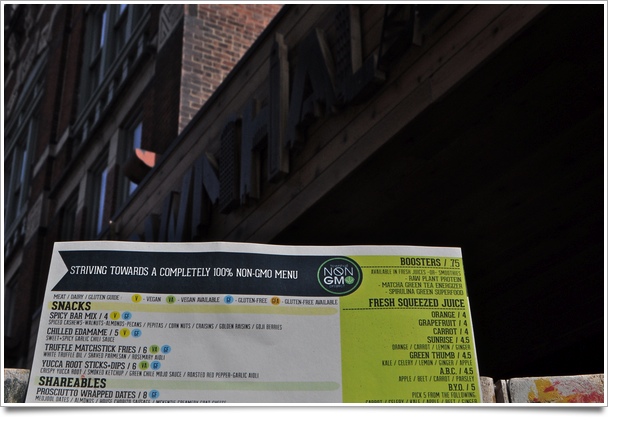
Eating out in Cleveland has changed dramatically in the last 25 years. Once it was all about pierogies and schnitzel, hamburgers and steak. Now it’s not hard to find vegetarian-friendly places. In fact, a small but growing number of restaurants spotlight vegan and even gluten-free entries on their menus. Several now offer vegan nights. And it’s unremarkable anymore when a restaurant boasts that it features local, seasonal, sustainably grown & raised ingredients.
So where does it go from here? The big bustling Townhall, which opened last year in Ohio City, describes its food as “fast casual.” Like a lot of area restaurants, it promotes its use of organic, local, sustainably grown and raised ingredients and a menu with copious vegetarian, vegan and gluten-free choices. It offers a special Vegan Mondays menu that ups the number of vegan dishes available. But now it’s focusing on a new horizon: working toward being GMO-free.
It’s something Bobby George, who co-owns Townhall with chef Fabio Salerno and Sean Heineman, is passionate about.
After being diagnosed with a liver ailment, George became interested in what he was eating and the impact it had on his health. He came to the conclusion that foods containing GMOs weren’t healthy. He says of a GMO-free diet, “It will change your life.”
GMOs — genetically modified organisms — were originally developed to improve crop yields and, supposedly, the nutritional value of foods. They were also intended to produce crops that could withstand higher doses of herbicides and pesticides. While it’s unclear whether the foods themselves are harmful to health, it’s not debatable that higher doses of killer chemicals are.
Meanwhile, controversy has raged across the country as cities and states have attempted to pass consumer information laws requiring that GMO foods be labeled, while the industry that produces them has spent tens of millions of dollars to defeat such laws.
The Non-GMO Project is a nonprofit organization based in Washington state that’s fighting back, educating consumers about GMOs and verifying non-GMO products as much as possible. So far, it hasn’t certified a restaurant as being GMO-free. George would like to see Townhall be the first in the country certified by the Non-GMO Project. But there are challenges. Sourcing is number one. Going GMO-free imposes some menu limits.
Currently, 100% of Townhall’s produce GMO-free, and as of this week, all their meat (To be GMO-free, livestock must not consume feed that contains GMOs). Even their coffee and the mixers used in their drinks are GMO-free.
“I’m taking a pork chop off the menu,” he says. “There’s only one supplier in the country and he can’t service us.”
Other products aren’t so easy to eliminate. Non-GMO frying oil is hard to find, he says.
“And sometimes you just don’t know,” he adds. “I think I’m about 75% GMO-free now, but everything hasn’t been tested.”
He’s found that sometimes his account representatives will say a product is non-GMO “and they’re lying.” Meanwhile, he’s partnered with Gabe Nabors of the Mustard Seed Markets to jointly locate and bring in non-GMO products.
George says that going GMO-free involves some sacrifice in profit — about 25%.
But he says, “I’m passionate about it. I want to get the word out. American is the only country in the world that doesn’t have to label GMO foods.”
Photo by Anastasia Pantsios